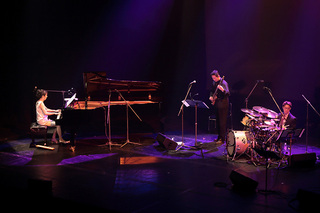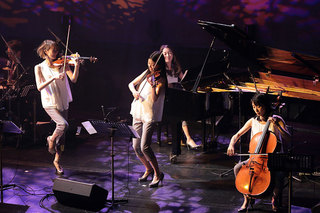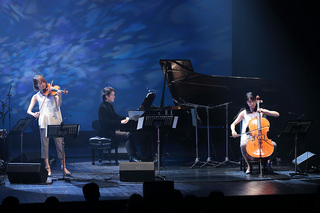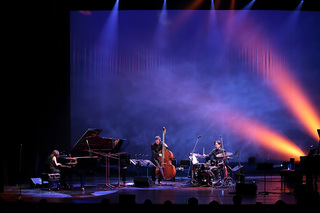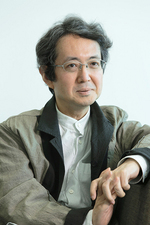The World of Haruki Murakami: Melding Text and Music
Jun-ichi Konuma (Professor, Faculty of Letters, Arts and Sciences, Waseda University / Music /Literature Culture Specialist)
The Japan Foundation has started a new initiative to offer different ways to overseas fans to enjoy the works of renowned Japanese writer Haruki Murakami. Titled "Watch", "Listen to" and "Talk about" Haruki Murakami, this program was to provide exposure to Murakami's works in Singapore and South Korea through a play, concert, and panel discussion.
Based on the sensational response that the events received in the two countries, combined with the many requests received from "Haruki-ists" in Japan and the fans of participating artists, Listen to Haruki Murakami--Jazz, Classical Music, and the Beatles" came to Tokyo for two days only on February 29 and March 1, 2016. Jun-ichi Konuma, the supervisor of the concert, contributed an article about the process of creating this concert, the music in Murakami's works, and international exchanges through this concert.
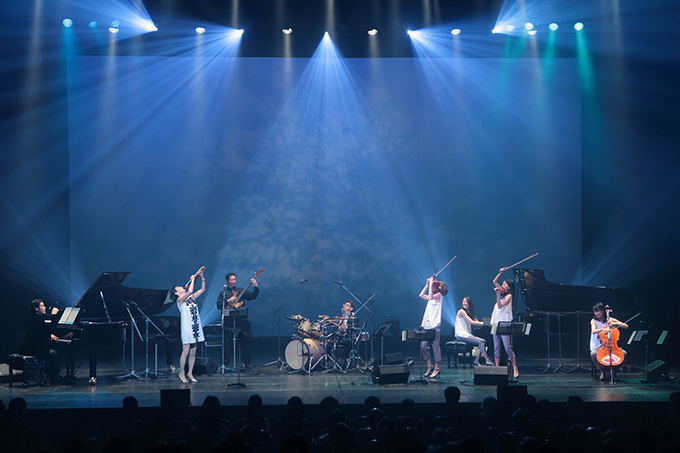
Encore at "Listen to Haruki Murakami--Jazz, Classical Music, and the Beatles," Tokyo, February 29, 2016
"We need to organize a concert with the title, 'Haruki Murakami and Music.' Would you help us?" This is how I was contacted about one year ago, in mid to late April 2015. It is true that Murakami's works are read avidly overseas. I also heard that, at the same time as the concert, Kafka on the Shore directed by Yukio Ninagawa would be performed, and the Singapore Writers Festival 2015 would be held. The Japan Foundation hoped to put together an original concert to accompany these events.
If you have read even one of Murakami's full-length novels, you would notice that they cite countless pieces of music. The music is not necessarily limited to a single genre. There is jazz. There is rock. There is classical music. Such music enters the story in a variety of contexts--it is playing on the radio or on the record player, it is being whistled, someone is performing it, or its sound is emanating from somewhere. Often the name of the music piece is mentioned, but readers are left to imagine what kind of sound it is or what kind of music it is.
What can be created from the links between such various music and the sentences and contexts of the novels? I spent last year's Golden Week holiday in early May rereading Murakami's novels, taking notes, and abstractedly drawing up an image of the concert in my mind. The one thing that was already decided was the musicians who would be performing in the concert-- Chihiro Yamanaka Trio in Singapore, Hiroko Kokubu Trio in Seoul, and 1966 Quartet in both cities. From these musicians, I had to come up with an overall concept.
It was around late May that I met with Ms. Sachi Oshima who was in charge of the concert. We discussed what had been already decided, what could be changed or what could not be changed, what she wanted to do, and what we would be doing. We first reached consensus that a passage from a novel would be read aloud or shown on the screen before and after a musical performance, and that the music would not be separated by genre. For instance, we would not have classical music in the first half and jazz in the second half. Different kinds of music would be performed on a single stage in succession. Otherwise, we would simply be going through the music listed in the novels. Instead, we wanted, in one form or another, the world of novels or the text in the novels to meld or disconnect with music in the ears of the people who came to listen to the concert.
However, this is not as easy as it sounds when you start thinking about the small details. Stage settings need to be designed. Sound adjustments need to be made by the instruments and the ensemble. How will we switch the settings from the quartet to the trio? How will actors enter the stage and read passages? Will they come out with a microphone in their hands or will there be a microphone stand? What are we going to do about the lighting? How will the reading of a passage end and how will the following musical performance start? The staging had to be envisioned while noting these details--the spatial movements of the people and the time required.
Ms. Oshima told me that she would get two pianos--one for the trio in stage right and one for the quartet in stage left. I was most grateful for this decision, in the sense that I could proceed with the plan of not separating the music works by genre. I believe those who have read up to here will also agree with me on this.
Many music pieces are cited in Murakami's works. The music has various functions. Some of the music plays like background music. Some is strongly linked to the development of the story or the theme. We also needed to take these aspects into account. We imagined that the audience would include the following people:
- People who have read and people who have not read Murakami's novels, so the music should appeal to both types of people.
- People who know that music is cited in the novels. People who were not particularly familiar with the music and perhaps not interested in it, even if they knew the title of the music. People who forgot about the music and made no particular attempt to listen to it once they closed their books. People who kept on reading without paying any special attention to the music. The concert will allow these people to become familiar with the music.
- People who know the title of the music cited in the novels but made no further efforts to access the music.
In addition, I wanted the audience to gain exposure to and become familiar with the music cited in the novels that is particularly well-known, as well as music that had an important meaning (this is a bit of educative thought of mine). There are people who like jazz, classical music, or other genres. Through the novels of Murakami, I wanted the concert to provide an opportunity for such people to gain exposure to music they are not normally exposed to. I anticipated that the audience would also be music fans--people who had no interest in Murakami or his novels but were slightly drawn to the performers and their programs.
Music comes up a lot in the novels. Nonetheless, there are extremely few instances in which the music is actually played. In most cases people become familiar with music through the media. In other words, we can see how the musical environment evolved or how the media environment has transformed since the late 20th century. Furthermore, the many music pieces cited in Murakami's novels have different levels of importance depending on the moment they enter the story. Their functions too are different. Not all of the music is necessarily pieces that can be identified from the past. Some music is anonymous or has titles that are not exactly as stated. Additionally, the main character or the narrator frequently reacts to or give an annotation to the music in the story. These physical sensations can be treated separately from the story or the theme of the novel. These are sensations that are transmitted to the listeners of the concert.
"Listen to Haruki Murakami--Jazz, Classical Music, and the Beatles," Tokyo
Top left: Hiroko Kokubu Special Trio; Top right: 1966 Quartet; Bottom left: Beethoven's "Archduke Trio," collaboration with Cho Jae-hyuck; Bottom right: Chihiro Yamanaka Trio
Let me return once again to the program and the specific pieces that were selected.
There were no major issues with the trio pieces. Most were standard pieces, and we just had to tell the trio the names of the music and their performance time. However, there was hardly any original music that suited the make-up of the 1966 Quartet. Its repertoire included songs of the Beatles and Michael Jackson but no classical music. Therefore, I myself arranged a few pieces so that they would not sound very strange.
In both Singapore and Seoul, we had a local pianist participate in the concert. A lot of discussion took place on their collaboration on several pieces with the quartet. Furthermore, their opinions were reflected in the selection of the pieces. As such, the concert was not simply a tie-up with Haruki Murakami featuring performances by Japanese musicians. We wanted the concert to be an "international exchange" with the respective countries, even though only in a small way. One of the ways that this was manifested was the encore. The trio and the quartet, which performed separately throughout the concert, and--while this could not be realized in Singapore--all others, including the local pianist, performed "Norwegian Wood" together.
There are many things I did not and could not write here, including the disagreements with local staff, troubles with the equipment and problems at the venues, the handling of copyrights, and more. But such occurrences are what precisely represent contact with different cultures and people-to-people exchanges. I gained tremendous experience through the emotions and thoughts that ran through my mind in holding this concert in three cities, and I am sure each of the people that were involved in organizing this concert feels the same.
Related Article
Behind the Scenes
"Creating a Concert Based on Haruki Murakami: 'Watch,' 'Listen to,' and 'Talk about' Haruki Murakami in Singapore and Seoul" Sachi Oshima (International Operations Section I, Arts and Culture Dept.)
Jun-ichi Konuma
Jun-ichi Konuma was born in Tokyo in 1959. With a focus on music, he writes reviews and expresses opinions that explore the relationship between sound and other genres, including literature and film. He is currently a professor at the Faculty of Letters, Arts and Sciences, Waseda University. He is a music and literary critic. His publications include Takemitsu Toru: Oto, Kotoba, Imeji [Takemitsu Toru: Sound, Words, and Image], Bakarakku, Ruguran, Jobin: Aisubeki Ongakuka tachino Okurimono [Bacharach, Legrand, Jobim: Gifts from Lovable Musicians], Minimaru Mujikku: Sono Tenkai to Shiko [Minimal Music: Its Evolution and Thinking], Miserareta Shintai: Tabisuru Ongakuka Korin Makuphi to Sono Jidai [Enchanting Physique: Traveling Musician Colin McPhee and His Era], and Eiga ni Mimi wo [Ears to Film]. His new book is Ongaku ni Shizen wo Kiku [Listening to Nature through Music]. Works he has written and edited include Takemitsu Toru Esseisen [Essays of Takemitsu Toru], Takahashi Yuji Taidansen [Dialogues with Yuji Takahashi], and Jon Keji Chosakusen [Works of John Cage]. He appears on the NHK Educational TV program, "schola Sakamoto Ryuichi: Ongaku no Gakko" [schola Ryuichi Sakamoto: Music School], as a guest instructor.
Back Issues
- 2022.11. 1 Inner Diversity<3> <…
- 2022.9. 5 Report on the India-…
- 2022.6.24 The 48th Japan Found…
- 2022.6. 7 Beyond Disasters - …
- 2021.3.10 Crossing Borders, En…
- 2020.7.17 A Millennium of Japa…
- 2020.3.23 A Historian Interpre…
- 2019.11.19 Dialogue Driven by S…
- 2019.10. 2 The mediators who bu…
- 2019.6.28 A Look Back at J…


